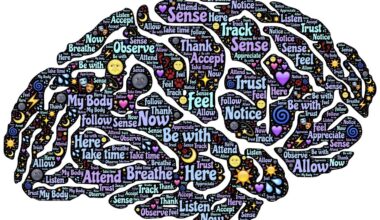Strategies for Improving Sleep in Anxiety and Depression Patients
Many individuals struggling with anxiety and depression often face significant sleep disturbances. One essential approach to alleviating these issues is developing effective sleep hygiene practices. Good sleep hygiene includes creating an optimal sleep environment that is dark, quiet, and cool. Additionally, establishing a consistent sleep schedule that promotes regular sleep-wake cycles can aid in improving sleep quality. Patients should aim to go to bed and wake up at the same time daily. Limiting screen time before bed can also be beneficial. Exposure to bright screens can interfere with melatonin production, leading to more significant sleep challenges. Moreover, incorporating relaxation techniques, such as deep breathing or meditation, prior to sleep can help in reducing anxiety levels and calming restless minds. Using white noise machines or earplugs can also assist in masking disruptive sounds that may affect one’s ability to fall asleep. Gradually, these practises contribute to better restorative sleep, positively influencing both physical and mental health. It’s crucial for patients to maintain these habits to achieve long-lasting improvements in their overall well-being.
In addition to practicing good sleep hygiene, cognitive behavioral therapy (CBT) has emerged as a valuable resource for individuals experiencing anxiety and depression-related sleep disorders. CBT specifically focuses on changing negative thought patterns and behaviors associated with sleep difficulties. This therapeutic approach not only targets the underlying causes of insomnia but also encourages patients to confront their anxieties. Through structured therapy sessions, patients can learn coping mechanisms and rational problem-solving skills. Establishing realistic bedtime routines and managing intrusive thoughts can significantly enhance sleep quality. Besides, integrating mindfulness practices into daily routines has shown promising results. Mindfulness helps individuals become more aware of their thoughts and feelings without judgment. Consequently, patients can develop a greater sense of control over their racing thoughts and emotions before bedtime. Furthermore, implementing relaxation exercises within CBT can decrease anxiety and stress, allowing for a more peaceful transition into sleep. Research suggests that combining therapy with self-care strategies may encourage positive outcomes. Patients should seek a licensed therapist trained in CBT for effective guidance tailored to their unique sleep issues.
The Role of Diet in Sleep Quality
Diet plays a pivotal role in sleep quality, particularly for those suffering from anxiety and depression. Consuming a balanced diet rich in vitamins and minerals can fundamentally impact sleep patterns. Foods containing magnesium, such as leafy greens and nuts, are essential for promoting relaxation and muscle function. Additionally, fruits like bananas and cherries are natural sources of melatonin, the sleep hormone, contributing to improved sleep onset. On the other hand, patients should avoid caffeine and heavy meals close to bedtime. Caffeine stimulates the nervous system, hindering the ability to fall asleep. Alcohol, although sometimes perceived as a sleep aid, can disrupt the sleep cycle, therefore it’s essential to consume it in moderation. Hydration is also crucial; however, limiting fluid intake before bed can prevent nighttime awakenings. Moreover, nutritionists recommend small snacks that are high in carbohydrates and protein. These combinations can facilitate serotonin production, leading to a sense of calm and sleepiness. Adopting a healthier diet not only aids in better sleep but also enhances overall mental well-being, benefiting those struggling with anxiety and depression.
Physical activity is another essential strategy for improving sleep quality in individuals with anxiety and depression. Regular exercise can help alleviate symptoms of both mental health conditions while promoting better sleep. Engaging in aerobic activities, such as walking, running, or swimming, can increase the duration of sleep and enhance sleep efficiency. Physical activity naturally raises body temperature and, upon its decline after exercise, promotes feelings of sleepiness. It is crucial to note, however, that timing matters. Exercising too close to bedtime may lead to heightened energy levels, making it difficult to settle down for sleep. Patients are encouraged to aim for at least thirty minutes of moderate-intensity exercise, three to five days a week. Additionally, incorporating yoga and stretching can provide relaxation while lowering stress levels, further aiding sleep. Mind-body exercises, in particular, have been linked to improved sleep quality. By establishing a consistent exercise routine, individuals can experience reductions in anxiety and depression symptoms while reaping the restorative benefits of a good night’s sleep. Overall, maintaining active lifestyles supports both physical and mental well-being.
Salvaging Sleep with Better Habits
Establishing better sleep habits can significantly impact individuals with anxiety and depression. Sleep diaries can be a practical tool to track patterns that may need addressing. Recording sleep duration, wake times, and feelings upon waking can help clarify what interventions may be necessary. Additionally, when facing sleep difficulties, avoiding daytime naps can be crucial, as they can interfere with the natural sleep-wake cycle. If naps are unavoidable, limiting them to 20-30 minutes can minimize disruption. A crucial component of better sleep is also learning to detach from stressors before bedtime. Patients must create boundaries between their day and night, promoting a wind-down period before sleep. Utilizing techniques such as journaling before bed can help in processing the day’s events and clearing the mind. Furthermore, individuals should avoid discussing heavy topics or engaging in stimulating conversations close to bedtime. A calming pre-sleep routine, such as reading or listening to soothing music, can foster relaxation, setting the stage for restorative sleep. As individuals develop these habits, they can reclaim their sleep and improve mental health overall.
Supplements have also become popular in discussions about enhancing sleep quality, especially for those battling anxiety and depression. Certain vitamins and minerals have shown to play essential roles in regulating sleep. For instance, melatonin supplements may help activate the sleep-wake cycle. However, it is advisable for patients to consult their healthcare providers before starting any supplementation, ensuring safety and effectiveness tailored to their needs. Research also highlights omega-3 fatty acids as beneficial for improving mood while supporting better sleep quality. Studies suggest that Vitamin D may play a role in regulating sleep patterns, warranting a balanced intake through diet or supplements. Herbal remedies, such as valerian root, chamomile, and passionflower, have been explored for their natural calming effects. Patients have reported benefits from tea consumption before bedtime, promoting relaxation. Nonetheless, individual responses to supplements can vary, making it essential for patients to approach such options with caution. Monitoring effects and consulting health professionals will lead to informed choices regarding these potential aids. By integrating safe supplementation approach, many can find relief in both their sleep and mental health challenges.
Conclusion
In conclusion, enhancing sleep quality in individuals experiencing anxiety and depression is a multifaceted approach that demands a holistic perspective. Implementing a combination of good sleep hygiene, cognitive behavioral therapy, improved diet, and regular physical activity can significantly reduce sleep disturbances. Moreover, practicing mindfulness, establishing a calming pre-sleep routine, and exploring supplements can lead to positive outcomes. Each of these strategies contributes to restoring balance within one’s mental health and physical well-being. It is essential for individuals to tailor these methods to their preferences and lifestyles, seeking professional guidance when needed. As evidence suggests, prioritizing sleep is not just about managing fatigue but cultivating improved mental health overall. Patients are encouraged to view these strategies as ongoing commitments to their well-being rather than quick fixes. Building better sleep habits takes time, but with dedication, individuals can reclaim their ability to sleep soundly. Thus, fostering these healthy practices will ultimately lead to enduring benefits in the fight against anxiety and depression, empowering individuals to thrive in their daily lives.


